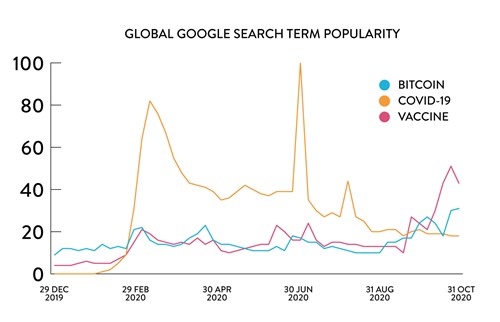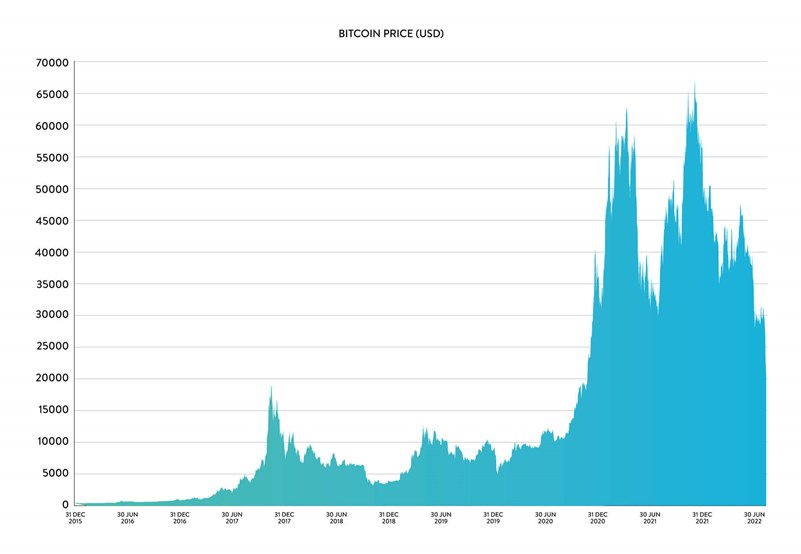"A cynic knows the price of everything and the value of nothing." Oscar Wilde
You may recall that in 2017-18 there was something of a media craze about investing in Bitcoin. What a difference time can make or not! The end to 2020 has a familiar feel about it.
While Bitcoin remains the largest cryptocurrency by value according to coinmarketcap.com, its price rallied in a spectacular way in 2020, rising from $10,803 at the start of October to $29,144 at time of writing on the 31st December. This has seen Bitcoin rekindle concerns around the rapid rise seen in 2017, after which it plummeted from a high of $20,089.00 on 17th December 2017 to just $3,545.86 on 17 December[1] a year later.
Whilst some investors still see Bitcoin as a buying opportunity, we’ve decided to leave Bitcoin and other cryptocurrencies on the side-lines. Here’s three reasons why…
It’s hard to value
A share gives you ownership of a small piece of a company. A bond, in its simplest form is a loan to a company or government. In other words, there’s something physical and tangible behind your investment. But what does Bitcoin entitle you to? The St Louis Federal Reserve published the still relevant research paper[2] in 2018 saying that ‘Bitcoin has no intrinsic value, but then neither does the US dollar, Euro or Swiss Franc’. We would disagree with the second part of this statement. You can’t pay your taxes with Bitcoin, and generally you must pay your taxes in the official currency of the country where they are due, although in some US taxes you can also pay in gold[3]. with any of the other government-backed currencies above. Consequently, unlike shares and bonds, there’s no reliable way to determine the REAL value of Bitcoin and most other cryptocurrencies, which makes it a risky investment.
It’s more about speculating than investing
There is no denying that Bitcoin and other cryptocurrencies have seen a dramatic rise over their lives. However, your success or otherwise depends entirely on timing. If you bought Bitcoin when it was trading at one US Dollar, then you may still have been up by around 21,000 times in June 2022. Looking at the average daily price changes for global shares, both up and down, Bitcoin has moved over 4 times as much over the past 5 years.[4]. This is clearly wonderful when it is rising, but less so when it is falling. Such a dramatically unstable market price puts Bitcoin closer to speculation than investing – something we are not in the business of. And, while some new cryptocurrencies are backed by so-called hard currency, there is little reason not to simply hold the hard currency directly rather than via cryptocurrency.
It presents some serious risks
Bitcoin and cryptocurrencies in general have been troubled by their fair share of regulatory issues. In several jurisdictions, mining cryptocurrencies is illegal and in others, the banking sector remains reluctant to exchange it for legal currency. But the adoption of cryptocurrency has certainly increased, and the issue remains of Central Banks and Governments introducing their own currencies[5] with the European Central Bank, US Federal Reserve, and Bank of England[6] all exploring their open options but also reviewing regulation. So, while adoption has certainly accelerated, even where cryptocurrencies are legal, there are additional tax complications to negotiate, surrounding what kind of investment cryptocurrency is classed as in that country and whether you purchased it, or mined it yourself.
Nonetheless, Bitcoin is still very popular – more so in fact than Covid-19 was in December 2020 according to the Google search trends shown in the graph below. However, this buzz is largely derived from both the network effect[7] – i.e. the more people that use Bitcoin, the more people will use Bitcoin. Similar to the way in which FriendsReunited was usurped by MySpace, which was then overtaken by Facebook, Bitcoin could be overtaken by a superior cryptocurrency, in time. But the media has also latched on, once again, to the massive prices moves, which has generated greater interest and seen further upward momentum.
Finally, there have been some well documented Bitcoin heists, notably leading Bitcoin exchange Mt. Gox in Tokyo from which around 740,000 Bitcoin was stolen during a major cyber-attack in 2014. More recently, the UpBit Hack, saw a South Korean cryptocurrency exchange experience the theft of 342,000 Ethereum[8]. With no investor protection against such threats, the risk of similar raids cannot be discounted and adds further to price instability, contrasting strongly with the level of protection afforded by FCA and PRA oversight of other investments within regulated institutions[9].

Even ignoring all of the contributing factors above, Bitcoin’s price has been exceptionally volatile to say the least (see graph below). This kind of volatility, and the unpredictable nature of the moves simply makes it incompatible with our investment philosophy and process of investing not speculating.

Source: Bloomberg
Figures in this blog are based on past performance and past performance is not a reliable indicator of future results.
Please remember the value of your investments can go down as well as up, and you could get back less than invested.
References:
[1] CoinMarketCap
[2]Aleksander Berentsen and Fabian Schär - A Short Introduction to the World of Cryptocurrencies
[3] STATE OF UTAH, Chief Sponsor: Brad J. Galvez - 2011 GENERAL SESSION
[4] Data from Bloomberg
[5] European Central Bank - Working paper series: Tiered CBDC and the financial system
[6] Bank of England - Central Bank Digital Currency: opportunities, challenges and design
[7] NFX - The Network Effects Manual: 16 Network Effects (And Counting)



